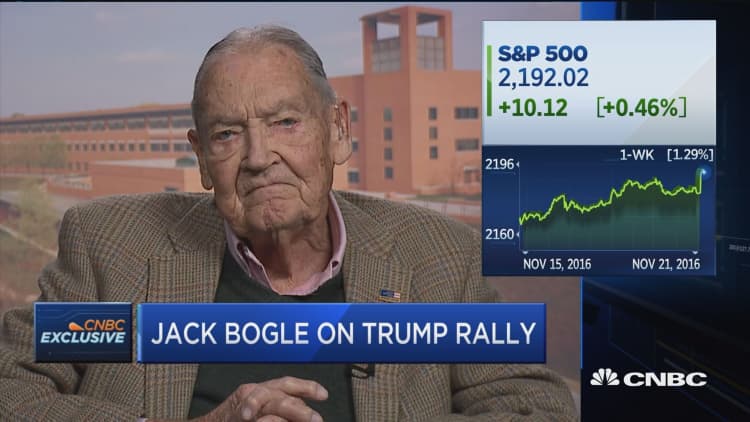With Donald Trump now in office as our nation's 45th president, CNBC asked legendary investor advocate Jack Bogle, the founder of the mutual fund giant Vanguard, what financial regulatory reforms he would like to see under the new administration.
Known as the father of index investing, Bogle founded Vanguard Group in 1975. The investment management firm has more than $3.5 trillion in assets, according to its website.
What defines his investor protection wish list? First of all, he said, "I'm not a real believer in government regulation, but the behavior of the financial industry generally has brought forth the proper governmental response," said Bogle, who has been a long-time critic of the industry's marketing practices, high fees and high executive compensation.
Bogle's abstemious lifestyle is directly at odds with Trump's flamboyance, and he has talked about his worries about Trump's long-term impact on society and, therefore, markets.
Nevertheless, here are the seven financial reforms he hopes the new administration will focus on in the months ahead.
1. Bring back Glass-Steagall.
Bogle and President Donald Trump agree on this issue. Trump said during his campaign that he favored the law and in October said he favored a 21st-century version of the 1933 law that required separation of commercial and investment banking.
Bogle said the upshot of allowing commercial banks to own investment banks is that underwriters — the investment bankers doing deals from IPOs to high-leverage acquisitions — can shift risk onto their parent companies' shareholders. "It's not a shock that people take a different view of risk when they are using other people's money," Bogle said.
2. Use principles-based regulation.
Financial regulations, such as the Dodd-Frank Act, passed in the wake of the financial crisis of 2008, tend to become more unwieldy over time. After a law is passed by Congress, federal regulators and industry lobbyists enter into years-long detailed negotiations that enable big companies to shift the laws long after the public's attention has moved on. It's been said that the rules implementing Dodd-Frank could fill 28 copies of Leo Tolstoy's War and Peace. Democrats and Republicans are at odds over whether Dodd-Frank protects investors from another 2008 crisis.
But Bogle favors a different approach altogether, known as principles-based regulation, which leaves the details vague and in effect means laws to be defined by the courts as they are challenged in different situations. Leaving financial regulation simple has its risks, too, of course: "We have a creative, lawyer-laden financial business," Bogle said. "Any mistakes, even a typo, they will drive a truck through it." But Bogle favors principles-based regulation on the whole. "In some areas there is too much detail. We should try to minimize the amount of small items that we regulate."

3. Roll back the equity crowdfunding decision.
The JOBS Act, passed in 2013, aimed at making capital more available to small businesses, and the SEC issued regulations to allow equity crowdfunding in 2015. The rules mean that companies can offer shares to small investors online. But Bogle said he worries the move will hurt small investors far more than it boosts the U.S. economy. "The possible harm to investors, who get caught in these schemes, is great," he said. "I don't like that trade-off.
4. Rewrite the 40 Act to embrace transparency and disclosure.
The Investment Company Act of 1940, known as the 40 Act, is the backbone of U.S. financial regulation, governing mutual funds and closed-end funds. It clearly sets out the limits regarding filings, service charges, financial disclosure and the fiduciary duties of fund companies.
Bogle said it should be rewritten to consider the now-immense size of the industry, which is dominated not by funds but by huge fund complexes and ETFs. It's easier for companies to market in misleading ways to consumers if they can shift their returns and expense ratios from one fund to another.
A revision should also take into account the migration of the fund industry from a professional services business to primarily a marketing business.
He acknowledged that regulating how funds market themselves is a "sensitive issue," but among the issues he has highlighted in the past are:
- Disclosing fees in terms of dollars instead of rates.
- Better disclosure about performance. "Consider risks, peers and appropriate market indexes. Look at cumulative returns over extended periods, and don't forget after-tax returns," he told a group of 40 Act lawyers.
- Disclosing fund turnover.
5. Embrace transparency and disclosure.
Bogle has been beating an unpopular drum lately, raising questions about ETFs, an industry that has amassed about $3 trillion in assets. He said research he's done on the returns actually paid to investors in Vanguard's biggest funds, where mutual fund and ETF investors are invested in the same underlying fund, showed ETF investors' returns were 1.6 percent lower than mutual fund investors over the same time period.
His explanation: turnover. The annual turnover of shares in a large ETF can be thousands of times its assets every year, compared with a mutual fund tracking the same index, where turnover is typically under 10 percent.
Bogle said funds should have to disclose their turnover and the percent of a fund's income that goes to its expense ratio. "I think that disclosure is really important," Bogle said. "Most investors won't bother to read and understand, but the press will publicize it, and I think people will pay attention."
6. Fully implement the fiduciary standard across retirement and non-retirement accounts.
Bogle has been a longtime advocate for the fiduciary standard, which simply says that brokers and advisors must act in the best interest of their clients. Many in the public-facing financial services industry, including financial advisors and stockbrokers, have been fighting the simple fiduciary standard for years.
The Department of Labor and the SEC have both been issuing different sets of rulemaking to advance the standard on different kinds of accounts, with the DOL's rulings on retirement accounts currently set to go into effect this spring; it's unclear what would happen to either initiative in the Trump administration.
The Department of Labor has estimated investors would save $17 billion if the standard were implemented on retirement advice alone, because brokers and advisors would not be allowed to sell overpriced funds.
7. Strengthen retirement via simple regulatory changes.
Experts estimate the number of poor or near-poor retirees will triple to 25 million by 2050. There are three elements to the retirement system, Bogle pointed out, all that need some changes.
Social Security can be fixed with relatively small changes, including increasing the wage base, fixing the cost of living adjustment, which is too generous, and probably raising the retirement age from its current low of 62. The pension system "is in tatters," he said. Companies have underfunded their pensions and states and municipalities have calculated future investment returns at too high a number, often as high as 7 percent or 8 percent.
Another change favored by Bogle: limiting the fees on funds offered in 401(k)s.
Surprisingly, however, Bogle said he's optimistic about the future. While he's long argued that financial services companies grow when they do well by investors, he has seen many companies take the opposite tack, seeking to make money off the backs of what he calls the "little guy."
In that long fight, he said, investors eventually will gain the upper hand, no matter what regulations hold sway in Washington. "Investors are smarter and more informed all the time," he said.
— By Elizabeth MacBride, special to CNBC.com





